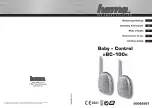
screen area, resulting in an image that is smaller (and less legible) than it needs to be.
RETURN TO TOP OF THE PAGE
P
Parallelogram Distortion
See Geometric distortion.
Phosphor
Generic name for the class of substances that exhibit luminescence. To produce a picture on screen,
phosphors are deposited on the inner surface of the picture-tube screen and excited into luminescence by
the electron beam. Typical examples of phosphors are P22 medium short-persistence phosphor and EBU
high-color-saturation phosphor.
Pin-cushion Distortion
See Geometric distortion.
Pixel
Abbreviation for picture element, the smallest element of the picture that can be displayed on the screen. The
smaller the pixel size, the better the resolution of the monitor. Pixel size is determined by the size of the
electron spot on the screen and not necessarily by the phosphor dot pitch (the size of the triad). Thus, a
monitor with a large electron spot covering several triads can exhibit poor resolution even though its dot pitch
is small.
Pixel frequency
The number of pixels that can be written in a video line per second.
Pixel rate
See pixel frequency
Plug-and-Play
See DDC. See USB section.
RETURN TO TOP OF THE PAGE
Glossary
file:///G|/manual/english/105B/glossary/glossary.htm (10 of 18) [10/1/1999 4:28:57 PM]









































